Business Repair and Transport correspondent
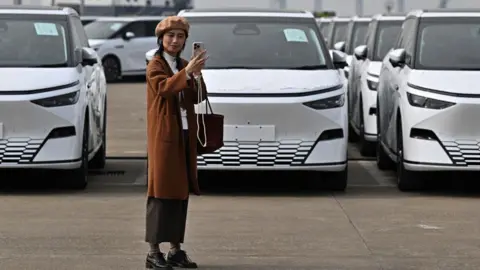 Getti images
Getti images“I drive an electric vehicle because I’m poor,” says Lu Iunfeng, private driver for rent, which is on a stuffed station on the periphery Guangzhou in the south of China.
Standing near, Sun Jingguo agrees. “The cost of driving a petrol car is too expensive. I save money that drives the electric vehicle,” he says.
“Also, protects the environment,” he adds, leaning to his white white Beying U7 model.
It is a kind of conversation on climatic campaigns dreaming of a hearing. In many countries, electric vehicles (EVS) are considered luxury purchases.
But here in China – where almost half of all cars sold last year was electric – it is a banal reality.
‘King of hills’
At the beginning of the century, the Chinese leadership set plans for dominance in the technologies of the future. Once the nation of bikes of China is now the world in the world in EVS.
For Guangzhou, more than 18 million people, the roar of a haste class became Hum.
“When it comes to Evs, China is 10 years ahead of us and 10 times better than any other country,” says Michael Dunne car analyst.
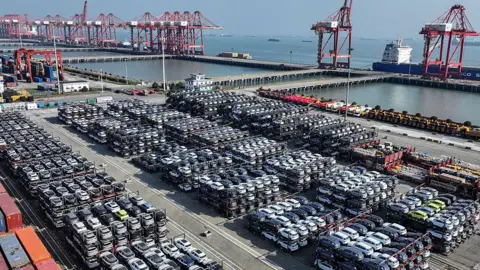 Getti images
Getti imagesThe Chinese Bid now runs a global EV market, after overreaving the American Rival Tesla earlier this year.
By BID helped a huge domestic market for more than 1.4 billion people and now asks to sell more cars abroad. So is the raft of other Chinese start-ups that make accessible EVS for the mass market.
So how was China built this lead and can it catch?
Main plan
In monitoring the origin of Chinese domination, analysts are often a credit gang van German – a German trained engineer who in 2007 became Chinese Minister of Trade and Science.
“He called and said,” Good news: We are now the largest car market in the world. Bad News: On the streets of Beijing, Shanghai, Guangzhou, all I see is foreign brands, “says Mr. Dunne.
At that time, Chinese brands simply could not compete with European, American and Japanese car manufacturers for quality and prestige. These companies had an unwavering head when it came to the creation of a car on gasoline or diesel.
But China had enough resources, qualified workforce and ecosystem suppliers in the motor industry. So, Mr. Van decided to “change the game and transfer the script to the script”, according to Mr. Dunne.
This was the main plan.
Although the Chinese government included EVS in its five-year economic draft, but until 2010., by 2010. it began to provide huge amounts of subsidies for industry growth.
China, unlike west Democracy, has the capacity to mobilize huge quarrels of its economy over several years according to its goals.
Infrastructure infrastructure projects and dominance in the country in production are for this.
The American Research Center, the Center for Strategic and International Studies (CSIS) estimates that since 2009. by the end of 2023. spent about 231 billion dollars (172 billion dollars) in the development of the EV industry.
Of consumers and carmines to electricity suppliers and battery providers, all in China have the right to money and assistance when it comes to EVS.
He fueled, for example, to move from smartphone battery to focusing on the production of EVS.
Catl based on Ningde – which supplies companies such as Tesla, Volkswagen and Ford – was founded in 2011. years and now produces a third of all batteries used for EVS worldwide.
This combination of long-term planning and government funding has also allowed China to dominate the critical supply chains in the production of battery.
It helped build the largest public network of public charging with stations concentrated in large cities, placing drivers just minutes from the nearest charger.
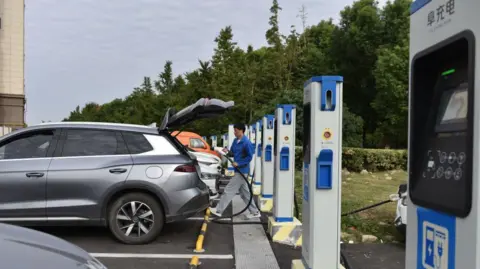 Getti images
Getti images“If you want to make a battery to put in an electric car today, all roads go through China,” says G. Dunne.
Some people relate to as “state capitalism”. Western countries call this unfair business practice.
Character managers insist that all companies, homemade or parties have access to the same resources.
As a result, they are now claimed, China now has a successful sector of initiating EV, which launched fierce competition and culture innovation.
“The Chinese government does the same thing you see in Europe and in the USA – providing policy support, encourage consumers and infrastructure”, Brian Gu, President of EV Maker Kspeng, says BBC.
“But I think China has done this consistently in a way that really encourages the most competent landscape that exists. No favorites of anyone,” he adds.
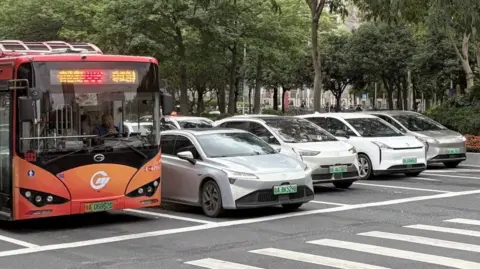 Annabelle Liang
Annabelle LiangXPENG is one of the “Chinese Champions”, such as G. PU puts, launches the front industry. Barely decade old and just to turn profit, start-ups are already in the top 10 EV producer.
The company has attracted some of the best young graduate students in Guangzhou in Guangzhou, where Casual Trained staff SIP straight white and Internet Streamers were selling cars live in the shop window.
Slida for brightly colored taking employees from the top to the ground floor would like to take more at home in a silicon valley than the Chinese industrial heart.
Despite the relaxed atmosphere, Mr. Gu says it is pressure to offer consumers better cars at lower prices “huge”.
The BBC was invited to the test drive of Kspeng’s Mone Max, which has just passed in sales in China about $ 20,000.
For this price, you get the possibility of self-driving, voice activations, tray and transmission of films and music. Young Chinese graduates, we are told that we see all this as standard characteristics for the first car purchase.
“New generation of EV manufacturers … Look at cars like another animal,” says David Li, co-founder and executive director of Hesaj, which makes Lidar Sensing technology used in many cars only-vehicle.
‘EW makes sense for me’
Young Chinese consumers are certainly attracted to the top-range technologies, but the huge amount of government spending goes for the development of EVS financially attractive, according to CSIS study.
The public members receive trading subsidies in their non-electric car for EV, as well as tax exemption and subsidized rates on public charging stations.
These perks took Mr. Lu to go to electricity two years ago. He paid 200 yuan ($ 27.84; £ 20.72) to fill the car for 400km (248 miles) driving. It now costs a quarter of it.
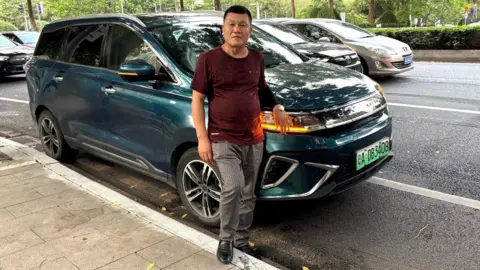 Annabelle Liang
Annabelle LiangPeople in China usually pay thousands for their registry panel in the vehicle – sometimes more than the cost of the car itself – as part of government efforts to limit congestion and pollution. Mr. Lu now gets green for free.
“Rich drive cars because they have unlimited resources,” says Mr. Lu. “EV just makes sense to me.”
The second owner of the proud EV in Shanghai, who wanted to use his English name, it was before he filled his vehicle at the station, it changes his car battery at one of the many automated stations for automating EV manufacturer NIO.
In less than three minutes, machines replace their flat battery with a fully defendant. It is a state of art technology for less than the price of fuel tank.
The road ahead
Government subsidies in the heart of the Chinese growth of EV are considered unfair by countries that want to protect their automotive industry.
The United States, Canada and the European Union have all imposed significant import taxes on Chinese EVS.
However, the UK says it does not plan to follow the suit – that makes it an attractive company market like Kospeng, which started delivering its G6 model in March, and Bid, which is in the UK in the UK and available for only 26,100.
This should be music in the ears of the western governments that delight transition to EVS, which United Nations called “Pivotal” to prevent climate disaster.
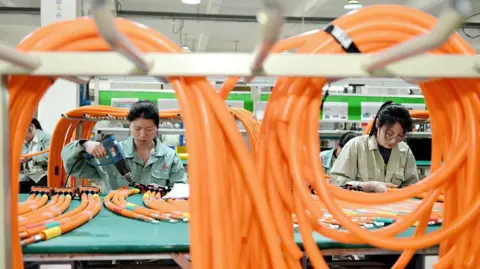 Getti images
Getti imagesSeveral Western countries, including the UK, say they will ban the sale of gasoline and diesel cars until 2030. Years. No country is better to help make reality from China.
“The Chinese think about the future where they only produce every car for the world. They look around saying,” Can someone do it better than us? “” Says Mr. Dunne.
“Leaders in Detroit, Nagia, Germany, UK, everywhere around the world, tremble their heads. It’s a new era, and the Chinese are feeling very confidently in their prospects.”
Despite the benefits of environmental protection, there is still doubt what it would relied on Chinese technology.
Britain’s city Mi6, Sir Richard Dearlov, recently called Chinese EVS “Peking Computers” that can be “checked by Beijing”.
His claims that Chinese EVs could one day immobilize British cities fired the executive vice president of Stella whether in the recent BBC interview.
“Anyone can ask for something if they lose the game. But what?” She said.
“Bid pays a very high data security standard. We use local carriers for all our data. In fact, we do it 10 times better than our competition.”
However, the concerns of Sir Richard care about the Etyar of the Previous Discussion on National Security around Chinese technology.
This includes the manufacturer of the Huawei telecommunications infrastructure, whose equipment is prohibited in several Western countries, as well as the application for social media tiktok, which is prohibited on government devices in the UK.
But for Sun Jingguo in Guangzhou, the message is simple.
“I think the world should thank China for this technology to bring the world”, laughs. “I work.”
Additional reporting Theo Legget, International correspondence correspondents in London.






